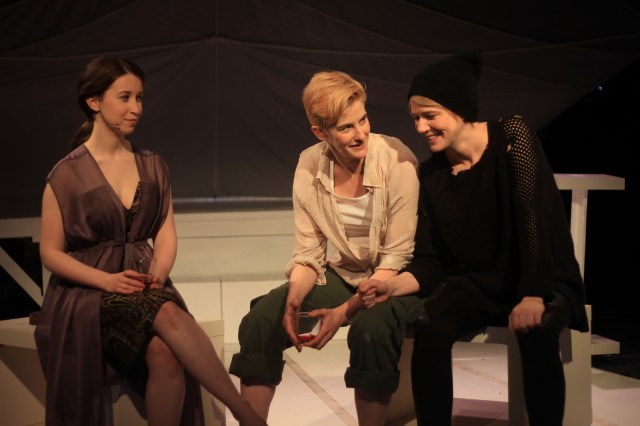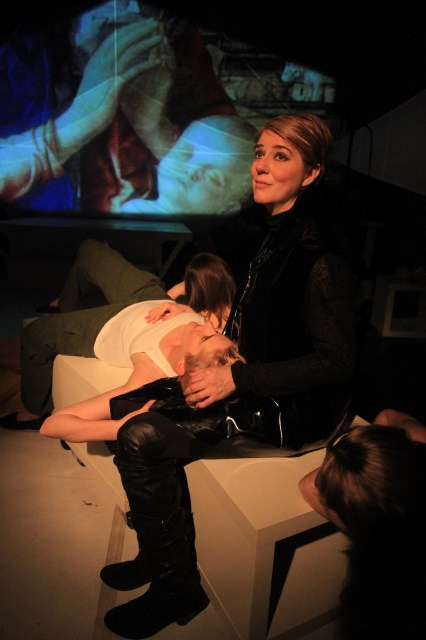I emailed our senior editors one line during the intermission of Mass, a lesbian rock musical with an all-female cast currently playing at the Brick Theatre: “Please don’t make me review this.” See, I love you guys, I love this community, and I don’t like giving negative reviews of anything, because I like to maintain the illusion that I’m a nice person! Despite my theatre degree, I never went into theatre criticism because of that whole “if you don’t have something nice to say” thing. If I don’t like something, I just quietly let it die. I pretend I’ve never read the book, just never got around to it. I pretend I never sat through the show.
But alas, I did sit through this show, and I’ve been urged to share my experience.
My girlfriend, Abby, was gracious enough to drop her evening plans to accompany me to this hour and a half of hellishness. We had dinner in Williamsburg at a place called Jimmy’s Diner before the show. Our food was delicious—the veggie burgers didn’t fall apart and I had a latke on mine and it was magic—and then the establishment caught on fire.
It dawned on me after the show that our evacuation of Jimmy’s Diner earlier that evening and the five fire trucks that appeared on the scene had foreshadowed the performance we were about to see.
Because basically what Mass did was take a decently talented, extremely attractive lead actor and metaphorically set her on fire.

Davis, Stone and Crow, via Joe Kolbow. Performers, whatever you read next, please know I still like you as human beings.
Mass is the story of three characters, Mary (played by Moira Stone), Françoise (Esther Crow) and Kate (Rebecca Gray Davis) trying to navigate their relationships and the art world. The book, music and lyrics were written by a man, Robert Honeywell, which I feel is important to note before going forward.
Mary and Françoise have a somewhat dysfunctional but no-more-dysfunctional-than-straight-crazy-artists relationship, while Kate is Mary’s power-hungry, trust-fund-dispensing, gallery-owning art-dealing older sister. We follow them on a journey from a New York art school to fame and fortune on the Shanghai art scene. The show illustrates the tension between the forward thinkers and the traditionalists and is supposed to ask the question: “How far would you go for art?”
The only question I was asking, however, was “How long do I have to stay in this theatre?”
The lead, Moira Stone, is quite a talented actor. If you wanted to subject yourself to the intellectual torture and eardrum evisceration that is Mass, you could get away with doing so by staring at her the entire time. Crow had some lovely moments of banter with audience members—she clearly has a strong improv back ground. Davis embodies the tightly-wound body language of her character, Kate, so well and has some really funny moments where her stick-up-her-ass personality comes to odds with the crazy artists in the room. The chorus was v. funny—art students/interns basically enslaved to Françoise as an “experimental art piece”—and was a clever piece of plot line on Honeywell’s part. There were moments. Not enough moments for me to tell you to go see the production, but hey, who am I to stop you?
Though you should know that not one cast member in this show can carry a tune.

Stone and Crow via Joe Kolbow. “Don’t worry, honey, the last caption says she still likes us as people!”
Songs are supposed to move the story forward in some way, but these characters burst into poorly-tuned lyrics for no apparent reason. I was hoping the dialogue would be better, but no. The show was filled with non sequiturs to the point where I was wondering if the actors were flubbing every other line. Also they use the term “lover” completely unironically within the first five minutes.
I had another paragraph here about the dialogue and plot and like, real theatre review stuff that I learned how to do back in University, but honestly I deleted it because reliving the experience made me want to defenestrate myself and I didn’t want to subject you to that. Let’s skip to the end.
I got my period in the middle of the scene when Mary urges Françoise and Kate to crucify her on live-stream. I’m sure there’s deep meaning here somewhere, or perhaps my body just decided it was going to self-destruct. The high point of my night was inserting my diva cup and washing away the bitter taste of that performance with a cold beer (in my mouth, not my vagina. I just realized how that sentence sounded).

via Dyke Problems (thanks Kate!)
And I felt SO BAD about it, because we knew the performers knew that we knew that this was not very good. It was a small house with a small audience and the heat was on full blast, so the lovely (not sarcastic, everyone was very nice) staff provided us with fans to wave about. These fans created a unique body language that involved many audience members hiding behind them in complete red-faced embarrassment, peering out with looks of wonderment. I could almost hear them thinking, is this really happening? I know this because at some point I started watching the audience to make sure I wasn’t hallucinating the train wreck before me.
Lack of budget is not an excuse for lack of quality. I have seen amazing shows on shoe-string budgets; hell, I’ve been in shows and produced shows with shoe-string budgets. Honestly those are the shows I prefer! If you have little to no money, budget differently. And if you live in Brooklyn, you can’t say you can’t find singers. Just because a performer is talented doesn’t make them the best fit for your show. And if you’re one of the performers and you’re reading this, a) I’M SORRY PLEASE I HOPE YOU STILL LIKE ME and b) I’d like to see you in literally anything other than this show. I’d like to see you navigate a bus schedule or read the phone book or, really, anything else.
I didn’t want to shit on a show that could’ve possibly involved queer performers, along with a queer storyline and a queer relationship that wasn’t sensationalized or even really the main focus (was there a main focus?). We need more queer pieces, more queer performers, more queer art — but I can’t say that without specifying that they must be of moderate-to-good quality. We’re here, we’re queer and we expect more!



This made me laugh a lot. I’m sorry you had to recap this.
If there was one good thing facebook did, it was introducing me to the word defenestrate
Can I be a huge dork an introduce you to the Defenestration of Prague? (Britannica: http://www.britannica.com/EBchecked/topic/473764/Defenestration-of-Prague) It’s pretty much the best-sounding historical event ever. It was a death-defying act of Bohemian revolt that kicked off the Thirty Years war, and yet still sounds less painful than Ali’s night of theatre. I’m so sorry.
The Defenestration of Prague is exactly how I learned what the word “defenestrate” meant! One of my best friends growing up (and still one of my best friends today, actually) told me about it while we were walking to a candy shop to get ice cream and wax bottles.
Nerds unite!
I saw the actual window where the defenestration happened! It was quite a defining moment in my nerd-dom. Though all my friends were like,”What’s defenestration? Sounds like something dirty. Is that why you’re so excited about this?”
It does sound kind of dirty, now that I think about it.
Ali: Me too!!! Good times in AP Euro.
Amanda: I’m so jealous! Prague is really high on my bucket list.
And it does sound kind of dirty, but in a good way?
I’d just like to take the nerddom to the next level. What makes the story even better is that there were not one, but two Defenestrations of Prague; apparently shoving people out of windows is addictive. Actually, if you want to get technical, there were four: the first, which precipitated the Hussite Wars; the one-and-a halfth, which was almost as painful a change of city government as a New England town hall meeting; the second, which y’all talked about; and the non-canonical third, in which a Soviet-era Czechoslovakian diplomat was found dead beneath a window (cue intrigue, conspiracy theories, James Bond.) (http://en.wikipedia.org/wiki/Defenestrations_of_Prague)
This is epic.
Mind blown.
I’m having a lot of feelings about authenticity (re. the playwright) right now.
If we’re talking about the fact that a dude wrote about lesbians, it actually was one of the few things I didn’t have a huge problem with, because the relationship, while insane, wasn’t insane because they were lesbians. It was because both the characters were the kind of unmitigated crazy that one learns about in art history class – their relationship was based on the brief and firey one between Gauguin and van Gogh. But in a broader sense, agreed: more queer lady playwrights! MOAR!
I more had a problem with the fact that the plot didn’t actually make any sense (and not in an experimental theatre way) and that there was no alcohol on hand in the theatre to remedy this.
I’d love to get more of your thoughts/feelings on authenticity re: the playwright!
I’m studying to be a queer lady playwright!!
Ahhh! Moar queer plays, plz and thks! :0)
I hate it when there are bad singers in musicals. They could be giving a Daniel Day-Lewis quality performance but then they open their mouth to sing and it just completely ruins it for you (which is of course why people who can sing AND act well are so fucking amazing).
HI, I’M TALKING TO YOU RUSSELL CROWE.
And it’s sad because I was initially so excited by the words “LESBIAN ROCK MUSICAL.”
I too was excited by the title of the article. But the review made me laugh. I agree that sitting through a bad show is like watching a train wreck.
Alternately horrifying and fascinating, and the whole time you’re hoping you don’t get whacked by large chunks of metal? (You think I’m joking. I wish I were.)
I think this was the tagline to a high school production of “The Wizard of Oz” I once saw.
I really appreciate the fact that half of the comments on this article are discussing defenestration.
I always appreciate your thoughts on queer theatre in NY, Ali. Excellent article.
If anyone’s interested, SCISSORING is going up at the Signature Theatre this week. Written by a queer playwright, and directed by a queer director (moi). And I promise, this one’s good.
https://www.facebook.com/events/357937797644558/?fref=ts